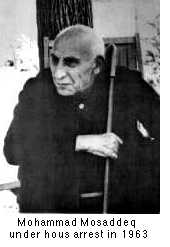Mohammad Mosaddeq (Mossadegh)
Iranian political leader and premier 1951 - 1953, b. 1880 (Tehran, Iran), d. 5 March 1967 (Tehran).
 Mohammad Mosaddeq was the son of an Iranian public servant and thus a member of the ruling elite. He studied in Switzerland and received a law degree from the University of Lausanne. On his return in 1914 he was appointed governor-general of the province of Fars.
Mohammad Mosaddeq was the son of an Iranian public servant and thus a member of the ruling elite. He studied in Switzerland and received a law degree from the University of Lausanne. On his return in 1914 he was appointed governor-general of the province of Fars.
After the ousting of the shah regime by Reza Khan in 1921 Mosaddeq served as minister of finance and briefly as minister for foreign affairs; but when Reza Khan was elected shah in 1925 Mosaddeq disagreed with the decision and left politics.
After Reza Shah Pahlavi's abdication in 1941 Mosaddeq returned to public life. In 1944 he was again elected into parliament. He began campaigning for the nationalization of Iran's oil industry, which was controlled by Britain and under pressure from Soviet interests as well. Mosaddeq reached his aim in 1951 when parliament passed his oil nationalization act. Public support for Mosaddeq grew beyond all bounds as a result, and the shah was obliged to appoint him premier.
Britain responded to the nationalization by withdrawing from the Iranian oil market. New buyers were not found immediately, and Iran fell into a crisis. In the ensuing power struggle shah Mohammad Reza Pahlavi attempted to dismiss Mosaddeq, but huge crowds of Mosaddeq supporters forced the shah to flee the country.
The USA, who had been watching the situation with growing concern, fearing the loss of control over one of the largest oil reserves, stepped in and installed Mohammad Reza Pahlavi again as shah of Iran. Mosaddeq was convicted of treason and sentenced to three years in prison. Having served his prison term he was kept under house arrest until his death. His nationalization of Iran's oil resources was, however, too popular to be abolished, and the oil reserves remained under Iranian control.
Mosaddeq's popularity and dedication to the public good were the keys to his success. His public support was not affected by his often strange personal behaviour - he wore pyjamas for public appearances and gave speeches from his bed, which had to be wheeled into the parliament building for the occasion. This and his disposition to weeping in public was explained as an expression of illness by friends and supporters and dismissed as publicity stunts by others.
home
 Mohammad Mosaddeq was the son of an Iranian public servant and thus a member of the ruling elite. He studied in Switzerland and received a law degree from the University of Lausanne. On his return in 1914 he was appointed governor-general of the province of Fars.
Mohammad Mosaddeq was the son of an Iranian public servant and thus a member of the ruling elite. He studied in Switzerland and received a law degree from the University of Lausanne. On his return in 1914 he was appointed governor-general of the province of Fars.